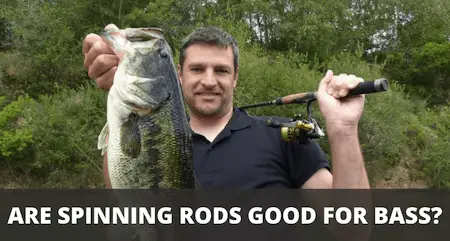Can You Catch Bass With A Spinning Rod?
UPDATED 17 MAY 2023
by Robert Ceran
If you’re new to bass angling, you’re probably asking yourself what gear is best for catching the most popular freshwater game fish in the US (and by bass I refer to both largemouth and smallmouth bass equally).
One of the main questions every novice bass angler needs to look into is: are spinning rods good for catching bass?
Here’s the quick answer:
Yes, spinning rods are definitely good for bass fishing. They have several key advantages that can help you catch more fish under certain conditions.

Specifically, they are better for casting smaller, lighter lures (or lightweight rigs), which is ideal for using finesse tactics to catch bass when the bite is slow, or when you’re fishing in very clear water.
Spinning rods are also more sensitive in terms of detecting subtle bites, which further helps to catch finicky bass that are not aggressively feeding.
Are spinning rods good for bass?
Yes, you can definitely catch bass with spinning rods, and they actually perform better than casting rods for some bass fishing tactics (see below for more details).
If you’re interested in getting a bass rod with these advantages, check out our review of the best spinning rod for bass.
You can also use spinning rods or casting rods interchangeably for most bass fishing lures and tactics.
But note that each rod type does have its unique advantages, making it better suited for some applications, and not as good for others.
Interestingly, many bass anglers prefer to use casting rods, and some even have a strong dislike for spinning rods. This is due to the fact that casting rods provide higher casting accuracy and more raw power to catch big fish close to cover.
It makes sense that you need both accuracy and power when fishing close to cover, since you need to cast your lure as close as possible to the cover, and when a big fish strikes the lure, you need a rod with enough power to force it away from the danger zone, before it can get your line snagged.
Because of this, casting rods are usually the preferred choice for jigging, flipping, or pitching with large lures close to sunken trees, overhanging bushes, or lily pads.
But keep in mind that these tactics don’t always work well, especially when bass aren’t in the mood to feed aggressively. There can be several reasons for this, but the most common one is when a cold front moves in, which almost always results in a slow bite. When this is the case, spinning rods can provide you with the edge to catch more fish, since they are better for finesse techniques.
Do pro bass fishermen use spinning rods?
In case you need further convincing that spinning rods are highly effective for bass fishing, just take a look at the pro bass fishermen that regularly use them to win tournaments, including legendary pros like Mike Iaconelli, Jordan Lee, Jesse Tacoronte, and many others.
The reason why some bass pros like to use spinning rods as their “secret weapon” is because most of their competitors tend to prefer a baitcasting setup. And when the fish aren’t in the mood to feed aggressively, this means that the pros using a casting setup aren’t going to catch a lot of fish, which gives those who are willing to switch out their casting rod with a spinning rod a significant competitive advantage.
Mike Iaconelli likes to tell the story of how he managed to win a major tournament using finesse tactics with his spinning rod, when most of the other bass pros had to go home without a single fish.
What are the advantages of spinning rods for bass fishing?
Spinning rods have several key advantages that make them ideal for certain kinds of bass tactics. The most important of these is that spinning rods are better for throwing lighter lures farther. For example, a spinning rod can be used to cast lures that weigh 1/8 oz or even less, while most casting rods struggle with lightweight lures in this size range.
Secondly, you can also use a lighter pound test line with a spinning rod and reel setup, which helps when fishing in clear waters that are heavily fished. Under these conditions, bass have often become adept at spotting your fishing line, which means you need to employ more stealth to catch them successfully.
Here are some additional advantages of spinning rods for bass fishing:
- They are easier to use for beginners.
- They perform better when casting into the wind.
- They are better for skipping lures.
When should you use a spinning rod for bass fishing?
As mentioned above, many pro bass fishermen reach for their spinning rod when the bite is slow. This typically happens when the weather changes quickly from high pressure to low pressure while a bad weather front moves in.
During these conditions, bass don’t feed actively, which makes it very hard to get them to take conventional lures and presentations. However, you can still entice them to bite by using finesse tactics, which involve lighter lures and rigs that are presented in a more subtle manner. Spinning rods are ideal for these tactics, which makes them the weapon of choice to catch finicky bass.
A second reason to use a spinning rod is when you’re fishing in clear lakes or rivers. Under these conditions, it’s much easier for bass to spot your fishing line, which means that a spinning rod with lighter pound test line is the way to go.
Also, if you’re casting a lot into the wind, a spinning rod will serve you better than a casting rod, since the latter usually ends up with massive backlash under these conditions. This is another reason to always keep one or two spinning rods in reserve on your bass boat.
If you like to skip lures for bass under docks or overhanging bushes, it’s better to use a spinning rod for this, since it takes a huge amount of practice to do this successfully with a casting rod.
Conclusion
In summary, spinning rods are great for catching bass with lightweight lures and finesse applications, and clearly they outperform casting rods in this category. They are also much easier to use for beginners, which makes them the ideal choice for novice bass anglers.
